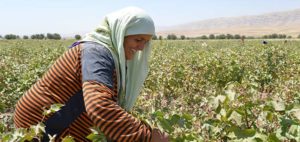 en
en EBRD promotes gender equality in the context of building climate resilience in Tajikistan
At a workshop held in the Tajik capital, Dushanbe on April 27th, the European Bank for Reconstruction and Development (EBRD) took stock of ongoing efforts to boost women’s economic opportunities in the face of a changing climate in Tajikistan.
The workshop is part of the EBRD-led Evaluation and Learning Activity, funded by the Climate Investment Funds (CIF). It aims to collect evidence on how private sector investments can support gender-sensitive, climate-resilient development in Tajikistan, lessons that will be used to improve the design and implementation of other similar interventions. This workshop focused on exploring the role of private sector in boosting climate resilience efforts through women’s economic inclusion, by bringing together over 65 representatives the government, business associations, civil society as well as the EBRD clients.
Operated under the model of Green Economy Financing Facility (GEFF), CLIMADAPT is a prime example of a financing programme to tackle gender issues. Under this programme, Tajik banks and microfinance institutions receive EBRD credit lines, co-financed by international donors, for on-lending to local businesses and households to facilitate access to and uptake of climate resilience technologies that ensure efficient use of water, energy and land resources in Tajikistan.
Promoting women’s economic opportunities is an important part to CLIMADAPT’s work. Its partner financial institutions, through which clients receive their loans, identify ways to support women’s access to finance and actively reach out to more women, including through partnering with local women business associations. As a result, nearly 30% of borrowers are female, in a country where female entrepreneurs are still a small minority. Around 33% firms in Tajikistan have female participation in ownership and only around 10% of firms have a female top manager.
The Green Climate Fund (GCF) has provided co-financing of US$ 378 million which will allow the EBRD to launch the next wave of “green” financing facilities (GEFFs) in Armenia, Egypt, Georgia, Jordan, Moldova, Mongolia, Morocco, Serbia, Tajikistan and Tunisia. The lessons learned on integrating gender issues constitutes a significant component of the work undertaken by these facilities.



